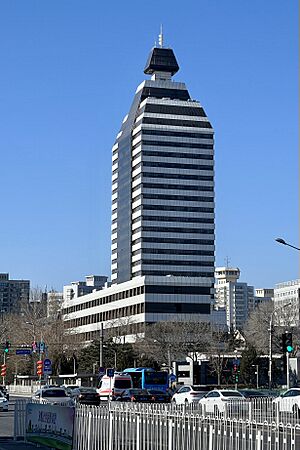Xinhua News Agency facts for kids
 |
|

Xinhua headquarters office in Beijing
|
|
|
Native name
|
新华通讯社
|
|---|---|
|
Formerly
|
Red China News Agency (1931–1937) |
| State news agency | |
| Industry | |
| Founded | November 1931, in Ruijin, Jiangxi, Chinese Soviet Republic |
| Founder | Chinese Communist Party |
| Headquarters | |
|
Area served
|
Worldwide |
|
Key people
|
|
| Owner | People's Republic of China (state-owned institution) |
| Parent | State Council of China |
| Subsidiaries | Xinhuanet Reference News China Xinhua News Network Corporation CNC World |
| Xinhua News Agency | |||||||||||
|---|---|---|---|---|---|---|---|---|---|---|---|
| Simplified Chinese | 新华通讯社 | ||||||||||
| Traditional Chinese | 新華通訊社 | ||||||||||
| Literal meaning | New China News Agency | ||||||||||
|
|||||||||||
| Abbreviated name | |||||||||||
| Simplified Chinese | 新华社 | ||||||||||
| Traditional Chinese | 新華社 | ||||||||||
| Literal meaning | New China Agency | ||||||||||
|
|||||||||||
Xinhua News Agency (pronounced SHIN-HWA), also known as the New China News Agency, is the official news agency of the People's Republic of China. It is a very important organization within the Chinese government.
Xinhua was started in 1931. Today, it is the largest media group in China. It acts as both a publisher and a news agency. This means it collects news and also publishes it.
Xinhua shares information from the Chinese government and the Chinese Communist Party (CCP). It publishes news in many different languages around the world. Its main office is in Beijing, close to the government's central buildings.
Some people have criticized Xinhua for spreading information that supports the Chinese government. They say it sometimes shares one-sided views. Xinhua aims to present its messages in ways that suit different audiences globally.
History of Xinhua News Agency

Xinhua's story began in November 1931. It was first called the Red China News Agency. This agency was set up in Ruijin, a city in Jiangxi province.
At first, it mainly shared news from other agencies for party and army officials. In November 1935, after a long journey called the Long March, the agency changed its name to Xinhua.
By 1937, Xinhua started translating news from other agencies. This included news from China and around the world. In 1940, Xinhua began using printing presses to produce its news.
During World War II, Xinhua started broadcasting news to other countries. It began sending news in English in 1944. After the Chinese Civil War in 1949, Xinhua represented China in places where China did not have official diplomatic offices.
In 1956, Xinhua began reporting on different opinions, including those critical of the CCP. A former director of Xinhua, Zheng Tao, said the agency was like a "bridge." It connected the CCP, the government, and the people. It shared both the people's needs and the government's policies.
In 2018, the United States government asked Xinhua's branch there to register as a "foreign agent." This means it has to tell the government that it works for a foreign country. In 2020, the U.S. government called Xinhua a "foreign mission." Xinhua officially registered as a foreign agent in the U.S. in May 2021.
In June 2022, Fu Hua became the president of Xinhua. He is a very important member of the Chinese Communist Party. In September 2022, Fu Hua said that Xinhua would always follow the party's direction.
Global Reach and Influence
By 2021, Xinhua had 181 offices around the world. It publishes news in many languages. Xinhua also manages how foreign news is released in China. Sometimes, it filters or changes these reports.
Xinhuanet is Xinhua's official website. It is a large online news platform. In 2010, Xinhua bought a large digital billboard in Times Square in New York City. It also started an English-language TV news channel.
Xinhua has paid other major news outlets, like The New York Times, to publish its special articles. These articles are called "advertorials" and are branded as "China Watch" or "China Focus." They look like regular news but are paid content from Xinhua.
Internal News for Officials
Xinhua also produces special reports that are not for the general public. These are called neican, or "internal reference" journals. They are only for government and party officials.
These reports contain information that the government considers too sensitive for everyone to see. They often include detailed analysis of international events or opinions about China. Journalists who write for these internal reports can be more open and detailed.
The most secret Xinhua reports go only to the top leaders of the party and government. For example, the first reports about the SARS outbreak were only for government officials.
Main Offices and Branches

Xinhua's main office is in Beijing, China. It is located very close to the headquarters of the Chinese Communist Party.
Xinhua has many offices around the world. Its first overseas office was opened in London in 1947. It also has major hubs in New York City, Asia, the Middle East, Latin America, and Africa. As of 2024, Xinhua has over 170 overseas offices.
Hong Kong Office
Xinhua's office in Hong Kong was very important before 1997. At that time, Hong Kong was under British rule. Xinhua's office acted like China's unofficial embassy there. This was because China did not recognize British rule over Hong Kong.
After Hong Kong was returned to China in 1997, the office was renamed. It is now called the "Liaison Office of the Central People's Government in the Hong Kong Special Administrative Region."
Cairo Office
Xinhua opened its main Middle East office in Cairo, Egypt, in 1985. This office helps manage news coverage for the entire Middle East region.
Portuguese Language Department
Xinhua has a special department that produces news in Portuguese. This department started in 2004. In 2016, they launched a new online portal for Portuguese speakers.
Working with Other News Agencies
Xinhua works with many other news organizations around the world. In 2015, Xinhua signed agreements with Russian state media to share content.
In 2018, Xinhua and the Associated Press (AP) from the United States signed an agreement. This agreement helps Xinhua operate in China. AP stated that this agreement does not affect its independence or editorial decisions.
A journalist named Joshua Kurlantzick noted in 2022 that Xinhua has been very successful in sharing its content globally. Xinhua offers its news for free or at a low cost. This makes it attractive to local news outlets, especially in developing countries. Many readers might not even notice where the news comes from.
New Technologies
In 2018, Xinhua worked with Tencent's Sogou company. Together, they launched the first artificial intelligence (AI) news anchor. This AI anchor can read news like a human.
How Xinhua is Organized
Xinhua News Agency has several different parts that work together.
Internal Departments
Xinhua has many internal departments that handle different tasks. These include:
- General Office
- Editorial Office (for domestic and international news)
- News Photography Department
- Sports News Department
- Communications Technology Bureau
- Foreign Affairs Bureau
Directly Connected Institutions
Xinhua also has institutions that are directly linked to it. These include:
- Audio and Video News Editorial Department
- News Information Center
- Reference News (a newspaper)
- Xinhua Daily Telegraph (another newspaper)
- New Media Center
Directly Connected Businesses
Xinhua owns several businesses. These include:
- Xinhua News Agency Investment Holdings Co., Ltd.
- Xinhuanet Co., Ltd. (the website company)
- China Photo Agency Co., Ltd.
- China Fortune Media Group Co., Ltd.
- Xinhua Publishing House Co., Ltd.
Offices Around the World
Xinhua has many offices both within China and in other countries.
Offices in China
Xinhua has branches in almost every province and major city in China. For example:
- Xinhua News Agency Beijing Branch
- Xinhua News Agency Shanghai Branch
- Xinhua News Agency Guangdong Branch
- Xinhua News Agency Tibet Branch
Offices in Asia Pacific
Xinhua has its Asia Pacific headquarters in Hong Kong. It has many offices in this region, such as:
- Xinhua News Agency Tokyo Branch - Japan
- Xinhua News Agency New Delhi Branch - India
- Xinhua News Agency Canberra Branch - Australia
- Xinhua News Agency Seoul Branch - South Korea
- Xinhua News Agency Singapore Branch - Singapore
Offices in the Middle East
Xinhua's Middle East headquarters is in Cairo, Egypt. It has offices in many countries there, including:
- Xinhua News Agency Algiers Branch - Algeria
- Xinhua News Agency Cairo Branch - Egypt
- Xinhua News Agency Riyadh Branch - Saudi Arabia
- Xinhua News Agency Istanbul Branch - Turkey
Offices in Latin America
Xinhua's Latin America headquarters is in Mexico City, Mexico. It has offices in countries like:
- Xinhua News Agency Buenos Aires Branch - Argentina
- Xinhua News Agency Rio de Janeiro Branch - Brazil
- Xinhua News Agency Havana Branch - Cuba
- Xinhua News Agency Mexico City Branch - Mexico
Offices in Africa
Xinhua's Africa headquarters is in Nairobi, Kenya. It has offices across the continent, such as:
- Xinhua News Agency Addis Ababa Branch - Ethiopia
- Xinhua News Agency Johannesburg Branch - South Africa
- Xinhua News Agency Dar es Salaam Branch - Tanzania
- Xinhua News Agency Lagos Branch - Nigeria
Offices in Europe
Xinhua's European headquarters is in Brussels, Belgium. It has many offices in Europe, including:
- Xinhua News Agency London Branch - UK
- Xinhua News Agency Berlin Branch - Germany
- Xinhua News Agency Paris Branch - France
- Xinhua News Agency Rome Branch - Italy
- Xinhua News Agency Moscow Branch - Russia
Offices in North America
Xinhua's North America headquarters is in New York City, United States. It has offices in:
- Xinhua News Agency Washington Branch - United States
- Xinhua News Agency Los Angeles Branch - United States
- Xinhua News Agency Ottawa Branch - Canada
|
See also
 In Spanish: Xinhua para niños
In Spanish: Xinhua para niños
- Mass media in China
- Propaganda in China
- China Xinhua News Network Corporation
- Xinhua–Sogou AI news anchor
- China News Service
 | Shirley Ann Jackson |
 | Garett Morgan |
 | J. Ernest Wilkins Jr. |
 | Elijah McCoy |


